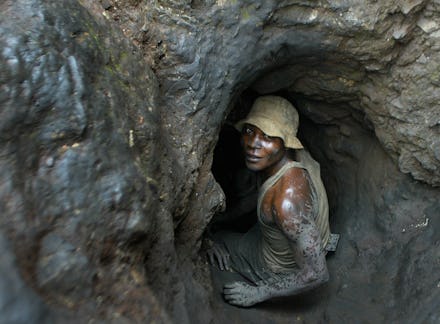Apple, Microsoft and Samsung Accused of Using Minerals Mined by Children to Make Phones

When you think of your "toxic" addiction to social media and your cellphone, you might consider that for some children in the world, your phone might have literally been poisonous.
Apple, Samsung, Microsoft and other phone manufacturers were accused by Amnesty International of using rare minerals mined by child laborers in their smartphones. Amnesty's investigation found that in the Democratic Republic of Congo (DRC), there are areas where children work in artisanal mines to feed the thriving market for cobalt, an ingredient in the lithium-ion batteries of modern smartphones. The DRC produces about 55% of the world's cobalt, the Global Mining Institute reports.
While many people may associate "artisanal" with craft beer snobs and woodworking classes, in the case of Congolese mining, it means digging by hand using rudimentary tools in sparsely regulated, impromptu mines.
For the investigation, Amnesty followed the supply chain of cobalt from the miners to the markets. After the ore leaves the various mines, it trickles up to a small handful of companies like Congo Dongfang Mining International (CDM), the largest company at the center of the investigation. After some processing, the cobalt shipped to CDM's Chinese parent company Huayou Cobalt, which further refines it and sells it to the companies that make phone batteries and their components.
When Amnesty asked the question "Does cobalt in the company's products originate in the DRC?" Apple, Microsoft, Samsung, Sony and HP were all unable to answer directly, with answers like "unable to say" and "Currently under evaluation."
Terrible records with no paper trail: Mining is particularly gruesome child labor. For only $1 to $2 a day, children as young as 7 can work long days in tunnels dozens of meters below the ground with no gloves or other protective equipment.
"Under international human rights law, states have a duty to protect against human rights abuses by all actors, including businesses."
Exposed skin contact with cobalt puts miners at risk for dermatitis, and miners young and old are exposed to billowing dust from the mining operations, putting them at risk for a possibly fatal condition called "hard metal lung disease." The DRC mining regulations provide no instruction on proper safety equipment.
But the blame game doesn't end with the DRC's neglect of human rights issues or U.S. corporations that fail to monitor their supply chains. The fact is that no country, including the United States, has a policy that forces corporations to publicly report on the dignity of their supply chains.
"Under international human rights law, states have a duty to protect against human rights abuses by all actors, including businesses," the report concludes. "This requires all governments to enact and enforce laws requiring corporate due diligence and public disclosure in relation to cobalt and other minerals."